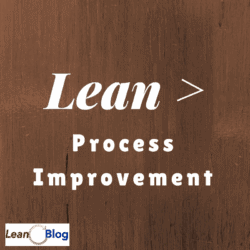Listen to Mark Graban read this post (subscribe to “Lean Blog Audio”)

In my travels, I often meet people or visit organizations that say something like:
“We're doing Lean… we just call it Process Improvement.”
They have a “Process Improvement” (PI) department, or they call it “Continuous Process Improvement” (CPI). They have people in roles like “Process Improvement Facilitators.”
While process improvement is great, in using a term like that, there's perhaps a risk that they miss the full and complete essence of Lean and, therefore, don't get the results that they might hope for.
“Lean” is based on the Toyota Production System and The Toyota Way management approach. Those who coined the term “Lean” had to come up with a descriptor that wasn't completely based on Toyota for these methods to be more accepted in the rest of the auto industry and in other settings. Toyota's own website says that Lean is basically a synonym for their approach.
Toyota (and their TSSC organization) can say they are teaching “TPS” to other organizations, but most others call it Lean. I'm not a Toyota guy, so I wouldn't feel right using the Toyota name or label for my work, as some others do.
I understand how the term “process improvement” might be less threatening than the word “lean,” with all the negative connotations that can come with it. Lean often makes people think of layoffs or not having what we need to do our work, although the Lean methodology is actually a great alternative to layoffs and a Lean environment provides better systems that provide what is needed for people to do work the right way.
Using the term “process improvement” sells Lean short. Yes, Lean provides methods and frameworks for identifying and eliminating waste and providing better value to customers. Lean tools and projects can be utilized to drive measurable improvements in a short period.
Lean is more than process improvement. It's more than engaging front line staff in continuous improvement. As Jamie Bonini, the leader of Toyota's TSSC organization that works with suppliers and non-profit organizations, explains, TPS (and Lean) is, at its foundation, an “organizational philosophy.”
Toyota describes TPS as an “integrated system” that includes:
- Technical methods (like just-in-time practices and “jidoka” to build in quality at the source)
- Managerial approaches (inspiring and developing people through problem solving)
- Philosophies
That philosophy is, according to Bonini:
- Customer first; provide customers with what they want, when they want it, and in the amount they want it
- People are the most valuable resource; Deeply respect, engage, and develop people
- Continuous improvement (kaizen); Engage everyone each and every day
- Shop floor (gemba) focus: Go to where the work is done to find and solve problems
See this page from Toyota's website with a helpful diagram and more details about this approach.
See more from Jamie Bonini:
Process improvement is a good thing, but Lean should be more than that.
Can a “Process Improvement” team influence the way managers operate?
Can a PI team influence senior leaders to embrace new mindsets and approaches to leadership? Far too often, they cannot. Senior leaders too often think “implementing Lean” is a matter of training frontline staff and managers. These senior leaders far too often don't ask their PI team (or outside consultants, like myself) to help them change. They often define the problem as “bad processes,” not “bad leadership.”
Using the technical methods of TPS, sometimes referred to as “Lean tools,” outside of a Lean culture, runs the risk of being ineffective or counterproductive.
The right tool in the wrong culture can cause a lot of frustration, as I've blogged about before, whether that's a Ford plant where people got in trouble for pulling the “andon cord” or my GM plant where people got yelled and screamed at about their hourly production numbers:
Lean should be a management system and a culture… at least it should be if an organization is trying to be as great as they can be.
In addition to “process improvement,” Lean should also be about designing new processes and workspaces (or reinventing them) in a “Lean Design” way. See posts and podcasts about this:
Does the focus on (or the label of) “process improvement” diminish Lean and hold back the progress that could be made out there? Is process improvement a good start as long as an organization aims to eventually accomplish more on the culture change front?
What do you think?
The Martin Luther King, Jr. Holiday
Here are some previous posts:
What do you think? Please scroll down (or click) to post a comment. Or please share the post with your thoughts on LinkedIn – and follow me or connect with me there.
Did you like this post? Make sure you don't miss a post or podcast — Subscribe to get notified about posts via email daily or weekly.
Check out my latest book, The Mistakes That Make Us: Cultivating a Culture of Learning and Innovation:










Toyota’s website does not actually say Lean is a synonym for TPS. The MIT researchers said/say that. Toyota’s web site says “…[TPS] is sometimes referred to as a ‘lean manufacturing system’ or a ‘Just-in-Time (JIT) system,’….” No indication of being synonymous, just other names that other people have given TPS.
Lean was indeed based on TPS, for 20 years, and also The Toyota Way starting around 2008. Regardless, while the two share many similarities, there are significant differences.
You’re observations about process improvement are on-target, especially when you say “Can a PI team influence senior leaders to embrace new mindsets and approaches to leadership? Far too often, they cannot.”
I agree that the focus on “process improvement” diminishes Lean. I believe people do this for the reasons outlined in my “One Difficulty Thing Hypothesis” blog post.
Fujio Cho et al used the term “Lean” in the Toyota Way 2001 booklet, but it is used two levels down from “Continuous Improvement” -> “Kaizen” -> “Building Lean Systems and Structure”.
In fact “Building Lean Systems and Structure” is just 1 out of 15 elements described in The Toyota Way 2001 (6th bullet from the top):
click for larger view
Thanks. What did they mean, precisely, by “Building Lean Systems and Structure?”
Lean Systems and Structure are further explained at 4th level down:
Pursuit of Profit Based on Cost Reduction
Elimination of Muda, Mura, Muri (Beyond Capability, No Value Added, Unevenness)
Regard for Next Processes / Just-in-Time
Revealing Problems / Jidoka
Cost reduction however is not achieved by firing personnel or squeezing out supliers, but e.g. by reducing parts as explained by former CEO Katsuaki Watanabe in this HBR article (search for Value Innovation):
https://hbr.org/2007/07/lessons-from-toyotas-long-drive
When I was first told that we were going “LEAN,” a quick Google search led me to conclude that it is just a scam to sell common sense.
Now, I am totally in love with LEAN.
This is a profoundly rich and enriching approach to improvement and success. I completely agree that leaving out the “management” and attempting to graft the tools is a GIGO methodology: Garbage in, Garbage out.
Thanks Mark, your books and texts and conversations with me over the years have been invaluable.
Yes, and the body or knowledge of Lean is bigger than Process Improvement, however it is not the incorrect to say that Lean is a set of principles, tools and techniques for process improvement’. Calling it a ‘Management Philosophy’ is not helpful and turns people off. You are right that the word ‘Lean’ itself turns people off too. What is management and ‘their philosophy’ for anyway … to make better processes ( Deming ) and we include the workers as being an important importance part of the process. So I would not be so quick to try to differentiate ‘Lean’ from PI …as it is has a greater and more important goal. Process Improvement is a difficult and important goal and ‘management philosophy’ is a servant to PI and the workers that run the processes. Consultants get a bad reputation specifically for trying to moving away from the practical aspects …such as processes and workers… and talking about Philosophies. Please!
Thanks for reading and thanks for your comment.
Jamie Bonini, from Toyota, says the philosphy is the most important thing. Ignore that advice at your own peril.
Of course we need Lean methods for practical problem solving and process improvement.
Lean methods are most powerful and most sustainable when the right philosphy and management style are in place.